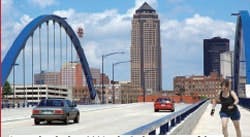A King fit for a motorist: Parkway serves as a direct shot to Des Moines
When an artery is clogged, the best thing to do is to relieve the congestion. Such was the case with I-235 on the most heavily traveled section of arterial highway in Iowa. Last June the flow of traffic eased as the long-awaited Martin Luther King Jr. (MLK Jr.) Parkway in Des Moines was opened to traffic. More than 70,000 motorists per day now have a clear path to Des Moines International Airport and into the city's central business district, taking some of that pressure off of I-235.
Initiated by the city of Des Moines in the late 1980s, the 2.6-mile MLK Jr. Parkway is one of the largest public works projects ever undertaken by the city. Plans for the sixlane arterial street had to be sensitive to the needs of nearby communities and historical districts.
In addition, the MLK Jr. Parkway provides a direct access route to Des Moines' business district-an area that was not previously served by an arterial street-opening up the opportunity for growth to businesses in the area.
Just as important, the adoption of an existing motif that is used throughout the city—an arch design—helps to connect the MLK Jr. Parkway with its surroundings.
One example of this design feature is the George Washington Carver Bridge, a twin tied-arch, single-rib, signature span that carries traffic over the Raccoon River. Earth Tech's design incorporates posttensioned concrete tie girders, as opposed to the traditional steel ties, to provide additional redundancy. Each of the tie girders is an arch shape that is repeated throughout the project.
On a second structure, the Grand Avenue Bridge, Earth Tech utilized a rigid frame design, convexshaped deck and an arch-shaped underside to complement the city's theme. Its aesthetically pleasing design, complete with special railings, architectural lighting and landscaping, creates an open and visually attractive entryway into the city.
Besides blending the MLK Jr. Parkway into the community, Earth Tech also needed to minimize the disturbance of the project on local residents and businesses. In order to make things flow smoothly, the team designed a comprehensive traffic management plan to construct the MLK Jr. Parkway in stages that would maintain access to local streets and businesses throughout the duration of the project.
The successful project has received 2005 awards from the Iowa chapters of both the American Society of Civil Engineering and the American Council of Engineering Companies.
Today, the MLK Jr. Parkway's landscape and walkways provide a roadway that stays true to the history of Des Moines. In addition, its forward-looking design will leave the city well equipped with features, such as readiness to accommodate an intelligent transportation system and fiber-optic systems that will serve the city of Des Moines well into the future.
